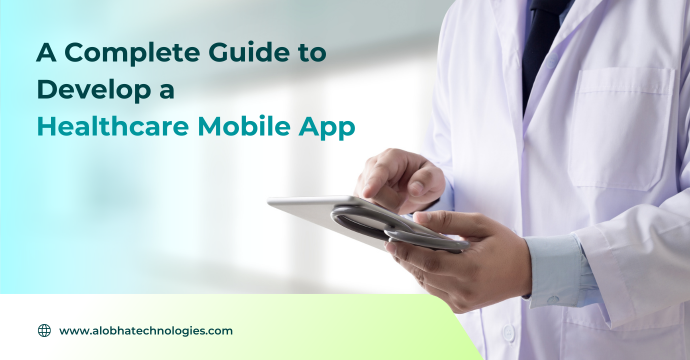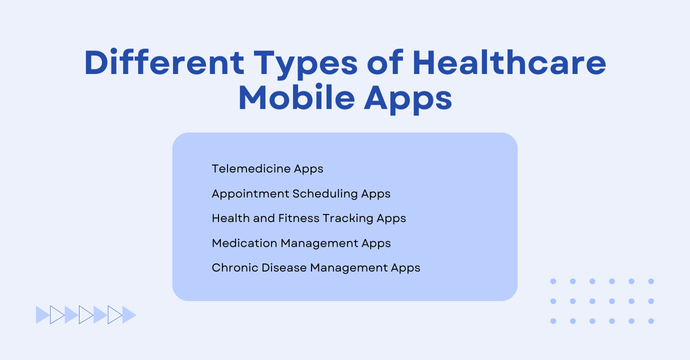
The healthcare industry is among the fastest-evolving and expanding sectors globally. Mobile devices and applications have significantly transformed the interaction and communication between providers and patients.
If you’re considering developing a mobile app for your healthcare business, you’ve come to the right place. Today, we’ll cover all aspects of healthcare mobile app development. So, let’s dive right in.
Why Does Your Healthcare Business Need a Mobile App?
In today’s digital age, having a mobile app for your healthcare domain is not just beneficial but increasingly essential. Here are several compelling reasons why investing in a healthcare mobile app can significantly enhance your business:
- Enhanced Patient Engagement: A mobile app allows healthcare providers to engage with patients in real-time. Patients can schedule appointments, access their medical records, receive reminders for medication or appointments, and communicate directly with their healthcare providers. This convenience improves patient satisfaction and encourages active participation in their own healthcare management.
- Improved Accessibility: With a mobile app, healthcare services become more accessible to patients regardless of their location or time zone. Patients can seek medical advice, access telemedicine services, and receive healthcare information conveniently through their smartphones. This accessibility reduces barriers to healthcare, particularly for patients in remote areas or with limited mobility.
- Efficient Workflow Management: Healthcare apps streamline administrative tasks and enhance workflow efficiency for healthcare providers. Features like online appointment scheduling, electronic health record (EHR) management, and billing and payment processing can automate processes that were previously time-consuming. This efficiency allows healthcare professionals to focus more on patient care rather than administrative tasks.
- Personalized Patient Care: Mobile apps can facilitate personalized patient care through features such as symptom checkers, personalized health tips, and medication reminders tailored to individual patient needs. This personalized approach improves treatment adherence and patient outcomes by empowering patients with relevant information and support.
- Health Data Management: Mobile apps can securely store and manage patients’ health data, ensuring easy access for healthcare providers while maintaining patient confidentiality and complying with regulatory requirements. This centralized data management system facilitates coordinated care among healthcare professionals and enhances the continuity of care for patients.
- Marketing and Branding: A well-designed healthcare app can serve as a powerful marketing tool to promote your services, attract new patients, and enhance your brand image. Through the app, you can share information about your healthcare services, patient testimonials, and health education content, establishing your authority in the healthcare industry.
- Adaptability and Innovation: The healthcare industry is evolving rapidly, driven by technological advancements and changing patient expectations. Investing in a mobile app demonstrates your commitment to innovation and adapting to the latest trends in healthcare delivery. It allows you to stay ahead of competitors and meet the evolving needs of your patients.
What Challenges Currently Exist in Healthcare Mobile App Development?
Developing mobile apps for the healthcare sector presents unique challenges that developers and stakeholders must navigate to create effective solutions. Here are some of the key challenges currently faced in healthcare mobile app development:
- Regulatory Compliance: Healthcare apps must adhere to strict regulations such as HIPAA (Health Insurance Portability and Accountability Act) in the United States or GDPR (General Data Protection Regulation) in Europe. Ensuring compliance with these regulations regarding patient data privacy, security, and confidentiality adds complexity to app development and requires careful implementation of technical and administrative safeguards.
- Interoperability: Healthcare mobile apps often need to integrate with existing electronic health record (EHR) systems, laboratory information systems, telemedicine platforms, and other healthcare IT systems. Achieving seamless interoperability among these systems can be challenging due to differences in data formats, protocols, and standards, leading to integration issues and potential data inconsistencies.
- User Experience (UX) Design: Designing an intuitive and user-friendly interface is crucial for healthcare apps to ensure usability, especially for users ranging from healthcare providers to patients with varying levels of technical proficiency. Balancing complex functionalities with simplicity and accessibility requires careful UX/UI design and iterative user testing to meet diverse user needs effectively.
- Security Concerns: Healthcare apps handle sensitive patient information, making them attractive targets for cyberattacks and data breaches. Implementing robust security measures such as encryption, secure authentication methods, and regular security audits is essential to protect patient data and maintain trust among users and regulatory authorities.
- Data Management and Analytics: Healthcare apps generate vast amounts of data, including patient health records, diagnostic results, and user interactions. Effectively managing and analyzing this data to derive meaningful insights while ensuring data accuracy, integrity, and accessibility is a significant challenge. Implementing scalable data storage solutions and leveraging analytics tools can help optimize data management practices.
- Integration of Emerging Technologies: The rapid evolution of technologies such as artificial intelligence (AI), machine learning, wearable devices, and the Internet of Medical Things (IoMT) presents opportunities for innovation in healthcare apps. However, integrating these technologies seamlessly into existing healthcare workflows and ensuring their reliability, accuracy, and compliance with regulatory requirements pose challenges that developers must address.
- User Adoption and Engagement: Encouraging healthcare providers and patients to adopt and actively use mobile apps can be challenging. Overcoming barriers such as resistance to change, concerns about data privacy, and disparities in access to technology requires effective communication, training, and ongoing support to promote app usage and engagement.
Different Types of Healthcare Mobile Apps
Healthcare mobile apps serve diverse purposes, catering to various needs of patients, healthcare providers, and organizations within the healthcare industry. Here are different types of healthcare mobile apps commonly used today:

- Telemedicine Apps: These apps enable remote consultations between patients and healthcare providers via video calls, voice calls, or chat. They facilitate virtual appointments, diagnosis, prescription, and follow-up care, improving access to healthcare, especially in remote areas.
- Appointment Scheduling Apps: These apps allow patients to schedule appointments with healthcare providers conveniently from their smartphones. They often include features like calendar integration, reminders, and the ability to reschedule or cancel appointments.
- Health and Fitness Tracking Apps: These apps help users monitor and track various health metrics such as physical activity, diet, sleep patterns, and vital signs. They may integrate with wearable devices like fitness trackers and smartwatches to provide real-time data and insights.
- Medication Management Apps: These apps assist patients in managing their medications effectively. They provide features such as medication reminders, pill identification, dosage tracking, prescription refills, and medication interaction alerts to enhance medication adherence and safety.
- Chronic Disease Management Apps: These apps are designed to support patients with chronic conditions such as diabetes, hypertension, asthma, and others. They often include tools for monitoring symptoms, tracking progress, setting goals, receiving educational resources, and communicating with healthcare providers.
- Mental Health and Wellness Apps: These apps offer resources and tools to support mental health and emotional well-being. They may include features like mindfulness exercises, mood tracking, cognitive behavioral therapy (CBT) tools, meditation guides, and virtual therapy sessions.
- Diagnostic and Monitoring Apps: These apps enable users to perform self-diagnosis or monitor specific health conditions using their smartphones or connected medical devices. They may include symptom checkers, medical image analysis tools, and devices for monitoring blood glucose levels, heart rate, or blood pressure.
- Educational and Reference Apps: These apps provide reliable healthcare information, medical news, treatment guidelines, drug information, and educational resources for healthcare professionals, students, and patients seeking to learn more about specific health topics.
- Emergency Response and First Aid Apps: These apps offer guidance and instructions for responding to medical emergencies, providing CPR, administering first aid, and locating nearby hospitals or emergency services.
- Hospital and Healthcare Facility Apps: These apps are developed for healthcare organizations to improve patient engagement, streamline communication, provide virtual tours, facilitate bill payments, offer access to medical records, and deliver personalized health information and alerts.
Read More: How to Choose a Web and Mobile App Development Company?
What Is the Cost of Developing a Healthcare Mobile App?
The cost of developing a healthcare mobile app can vary based on the features and functionality you require. It’s essential to recognize that developing a healthcare mobile app entails more than just upfront costs. You must also budget for ongoing maintenance and support expenses.
To initiate healthcare mobile app development, your first step should be contacting a reputable development company or a team of dedicated mobile app developers. They will collaborate with you to identify the optimal features for your app and provide a detailed cost estimate for development services.
When selecting a healthcare mobile app development company, prioritize those with a proven track record in similar projects. Their experience ensures they possess the necessary knowledge and skills to deliver a robust app tailored to your specific requirements.
Conclusion
Developing a healthcare mobile app requires a systematic approach, collaboration between healthcare experts and developers, and a commitment to meeting regulatory requirements and user expectations.
By following this comprehensive guide, you can create a successful healthcare mobile app that enhances patient care, improves healthcare delivery, and meets the needs of your target audience effectively.
Good Article so much helpful